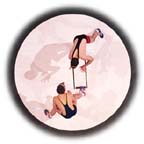![]()
NORTH ALLEGHENY WRESTLING
JAMIE KYRIAZIS, Head Coach

2001-2002
NUTRITION AND WEIGHT CONTROL
Rules on Weight Control
Following the lead of the National Collegiate Athletic Association,
the National Federation of State High School Associations has tightened
regulation on weight control in wrestling. The NCAA made eight-rule revision
after the deaths of three college wrestlers during weight-loss workouts.
All state associations are now required to develop and use a weight-loss
program that discourages severe weight reduction. Each wrestler is also
required to establish a certified minimum weight before January 15. Certification
at a lower weight is then prohibited during the season. Another rule requires
wrestlers to have at least half of the weigh-ins during the season at the
minimum weight to be used during the state tournament.
Education is the key here. Athletes and coaches need to understand the importance of proper nutrition and end the association of starvation with wrestling. School systems should require nutrition courses. In addition coaches, especially wrestling coaches, should have classroom-type discussion with their athletes about healthy eating and adequate fluid intake.
One key to success is being able to get quality work and effort out of your team on a consistent basis. Without proper nutrition, wrestler's attentiveness and stamina will fall off drastically, especially late in practice.
WRESTLING WITH WEIGHT
If you are a wrestler, you are probably not overweight. But you
may have to cut weight to achieve a lower weight standard or else be denied
permission to compete. Use the following tips to lose weight healthfully.
1). First of all, get a realistic picture of how much weight you need to lose by getting your body fat measured. The absolute minimal weight included 5 percent fat for men and 12 percent fat for women. The minimum weight recommended for wrestlers commonly included about 7 percent body fat. Trying to achieve a weight that will result in your having to starve yourself to lose muscle or dehydrate yourself to lose water weight is difficult and can hurt rather than enhance your performance.
If you don't have access to calipers or another means to measure your percent body fat, give yourself the less professional 'pinch test.' If you can pinch more than half an inch of thickness over your shoulder blade or hips, you can safely lose a little more weight.
2). Start to lose weight early in the season or, better yet, before the start of the season. That way you'll have time to lose weight slowly (one or two pounds per week) and more enjoyably. Your goal is to achieve and say at your lowest healthy body fat level.
3). Remember that it is counterproductive to lose weight rapidly before an event. If you do, depleted muscle glycogen and dehydration will take their tolls. In a study of wrestlers who quickly lost about eight pounds (4.5 percent of their body weight), the wrestlers performed 3.5 percent worse on a six-minute arm crank test designed to be similar to a wrestling competition. These results suggest that rapid weight loss in athletes prior to competition may serve as a detriment rather than offer a competitive advantage.
Athletes who struggle and starve to get to a low weight tend to fool only themselves. Remember, the odds are against the starved wrestler who crash diets to make weight as compared to the well-fueled wrestler who routinely maintains or stays within a few pounds of his wrestling weight during training.
- To lose weight, divide your calorie budget into three parts
of the day.
- No matter how much weight you have to lose, be sure to eat
at least 1500 calories of a variety of wholesome foods every day to prevent
vitamin, mineral and protein deficiencies. Do not eliminate any food groups.
- Water is not extra weight. Your body stores the precious water
in a delicate balance. If you disrupt this balance, you will decrease your
ability to exercise at your best. Using diuretics, rubber suits, saunas,
whirlpools, or steam rooms to dehydrate yourself is dangerous.
- When replacing sweat loss after workouts, note that juices,
sport drinks, and soft drinks all have calories. Ration them wisely. The
lowest-calorie fluid re-placer is water.
- If you are worried that strict dieting, as a teenager will
stunt your growth, note that you will catch up after the competitive season.
Many wrestlers are short in stature not because of malnutrition but rather
because of genetics. They tend to have short parents. Small people often
select a low-weight sport because they are more suited for that than for
football or basketball.
How Much Do I Eat? Sources of Carbohydrates and Proteins
The information supplied in the nutrition section of
our web pages is just a suggestion.
You should consult your dietian or family physician.
NORTH ALLEGHENY HAS A RICH WRESTLING TRADITION
~50 WPIAL Individual Regional Champions
~11 Western Pennsylvania Team Championships
~22 PIAA State Champions
~5 State Team Championships
~30 California State Champions(now known as Powerade Tournament)
~7 WPIAL Team Champions~27 State Place Winners
~532 Wins, 154 Losses and 3 ties since 1954
North Allegheny School District is located approximately
20 miles north of Pittsburgh, Pennsylvania.
Athletic Office-724-934-7238
!
